The
most characteristic feature of English is usually said to be its
mixed character. Many linguists consider foreign influence,
especially that of French, to be the most important factor in the
history of English. This wide-spread viewpoint is supported only by
the evidence of the English word-stock, as its grammar and phonetic
systems are very stable and not easily influenced by other languages.
To
comprehend the nature of the English vocabulary and its historical
development it is necessary to examine the etymology of different
layers, the historical causes of their appearance, their volume and
role and the comparative importance of native and borrowed elements
in enriching the English vocabulary.
According
to their origin words can be native and borrowed. A native word is a
word which belongs to the original English stock as known from the
earliest available manuscripts of the Old English period.
Native
words are further subdivided into the words of the Indo-European
stock and those of the Common Germanic origin. The words having
cognates in the vocabularies of different Indo-European languages
form the oldest layer. It has been noticed that they readily fall
into definite semantic groups. Among them we find terms of kinship
(mother, father, son, daughter), names of animals and birds (cat,
wolf, goose), parts of human body (arm, eye). Some of the most
frequent verbs belong to this word stock: come, sit, stand. Most
numerals are also of the Indo-European origin.
A
bigger part of the native vocabulary consists of the words of the
Common Germanic word stock. Such nouns as summer, winter, rain, ice,
hat; the verbs to bake, to buy, to make, to meet; the adjectives
deaf, dead, deep are of the Common Germanic origin. Most adverbs and
pronouns also belong here.
Together
with the words of the Common Indo-European stock the Common Germanic
words form the bulk of the most frequent elements used in any style
of speech.
Characteristic
Features of the Native Vocabulary
1.
The words are monosyllabic: sun, wood, break.
-
They
are polysemantic: hand – 1. Part of the human body. 2. Power,
possession, by a responsibility.3. Influence. 4. Person from whom
news comes. 5. Skill in using one’s hands. 6. Person who does what
is indicated by the context, performer. 7. Workman. 8. Share in
activity. 9. Pointer, indicator. 10. Position or direction. 11.
Handwriting. 12. Signature. 13. Number of cards held by a player.
14. Unit of measurement. 15. Applause by clapping.
3.
They are characterised by high frequency.
4.
Native words are usually found in set-expressions.
5.
Verbs with post-positions are usually native: to look for, to look
after.
6.
They are characterised by a wide range of lexical and grammatical
valency.
7.
If words begin with wh, wr, tw, dw, sw, sh. th; if at the end they
have dge, tch,nd, ld; if the roots have ng, aw, ew, ee, oo they are
native.
2. Causes and Ways of Borrowing into English
In
its fifteen century long history recorded in written manuscripts the
English language happened to come in long and close contact with
several other languages, mainly Latin, French, Old Norse. The great
influx of borrowings from these sources can be accounted for by a
number of historical causes. Due to the great influence of the Roman
civilisation Latin was for a long time used in England as the
language of learning and religion. Old Norse was the language of the
conquerors who brought with them a lot of new notions of a higher
social system – developed feudalism – it was the language of
upper classes, of official documents from the middle of the 11th
century to the end of the 14th
century.
In
the study of the borrowed element in English the main emphasis is as
a rule placed on the Middle English period. Borrowings of the later
periods became the object of investigation only in recent years.
These investigations show that the flow of borrowings has been steady
and uninterrupted. The greatest number of them has come from French.
A large portion of them (41) is scientific and technical terms.
The
number and character of borrowings do not only depend on the
historical conditions, on the nature and length of contacts but also
on the degree of the genetic and structural proximity of the
languages concerned. The closer the languages the deeper and more
versatile is the influence. Thus under the influence of the
Scandinavian languages, which were closely related to Old English,
some classes of words were borrowed that could not have been adopted
from non-related or distantly related languages.
Borrowings
enter the language in two ways: through oral and written speech. Oral
borrowing took place chiefly in the early periods of history, whereas
in recent times written borrowing gained importance. Words borrowed
orally are usually short and they undergo more changes in the act of
adoption. Written borrowings preserve their spelling.
Borrowings
can be borrowed through transcription (football,
trailer, jeans),
transliteration (cruise,
motel, club).
Besides there can be loan words (blue
stocking, collective farm).
Соседние файлы в предмете [НЕСОРТИРОВАННОЕ]
- #
- #
- #
- #
- #
- #
- #
- #
- #
- #
- #
Слайд 1
ETYMOLOGY OF ENGLISH WORDS. NATIVE AND BORROWED WORDS
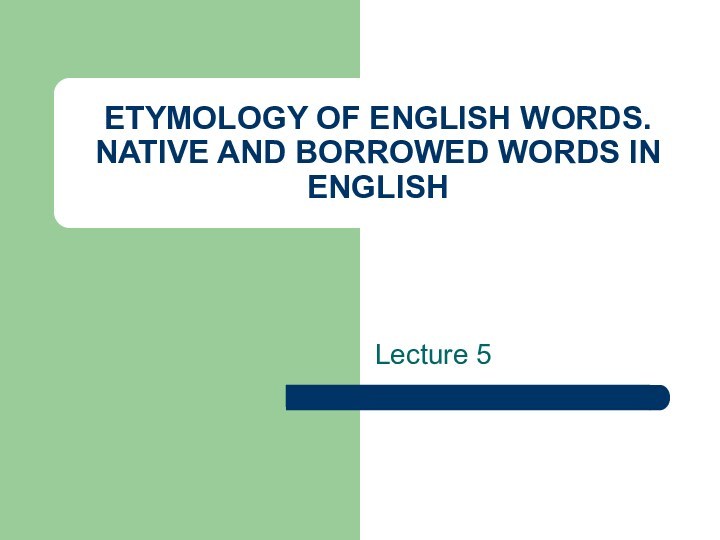
IN ENGLISH
Lecture 5
Слайд 2
Lecture 4
THE ORIGIN OF ENGLISH WORDS;
ASSIMILATION OF LOAN
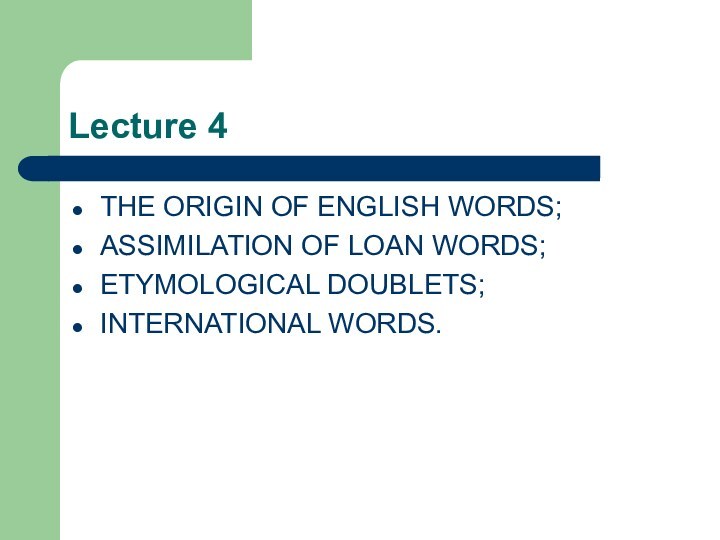
WORDS;
ETYMOLOGICAL DOUBLETS;
INTERNATIONAL WORDS.
Слайд 3
Literature:
Арнольд И. В. Лексикология современного английского языка. //
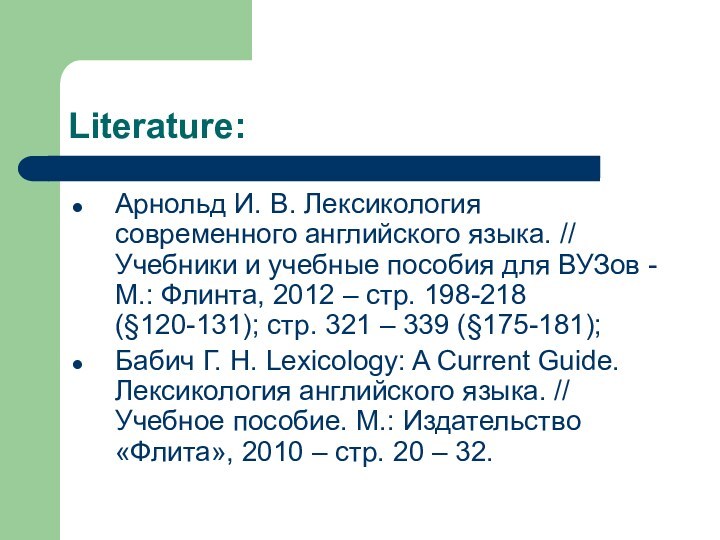
Учебники и учебные пособия для ВУЗов — М.: Флинта,
2012 – стр. 198-218 (§120-131); стр. 321 – 339 (§175-181);
Бабич
Г. Н. Lexicology: A Current Guide. Лексикология английского языка. // Учебное пособие. М.: Издательство «Флита», 2010 – стр. 20 – 32.
Слайд 4
THE ORIGIN OF ENGLISH WORDS
Native words:
—
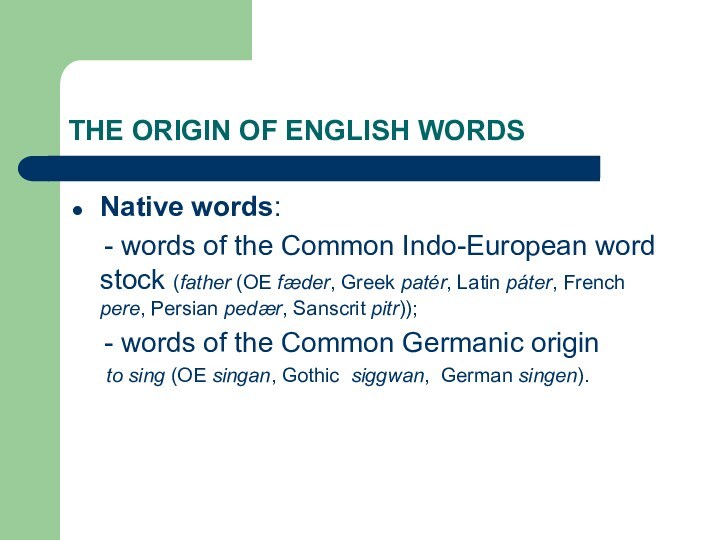
words of the Common Indo-European word stock (father (OE
fæder, Greek patér, Latin páter, French pere, Persian pedær, Sanscrit
pitr));
— words of the Common Germanic origin
to sing (OE singan, Gothic siggwan, German singen).
Слайд 5
THE ORIGIN OF ENGLISH WORDS
simple structure (they are

often monosyllabic),
developed polysemy,
great word-building power,
an ability to enter a
great number of phraseological units,
a wide range of lexical and
grammatical valency,
stability
Слайд 6
THE ORIGIN OF ENGLISH WORDS
Sourse of borrowing —

the language from which the word is taken;
Origin of
borrowing — the language to which it may be traced.
Слайд 7
THE ORIGIN OF ENGLISH WORDS
Translation: wonderchild ← Wunderkind
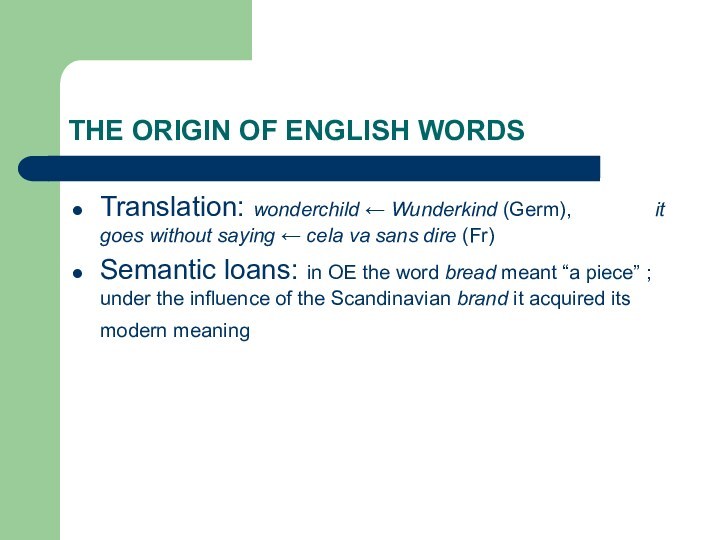
(Germ), it
goes without saying ← cela va sans dire (Fr)
Semantic
loans: in OE the word bread meant “a piece” ; under the influence of the Scandinavian brand it acquired its modern meaning
Слайд 8
THE ORIGIN OF ENGLISH WORDS:
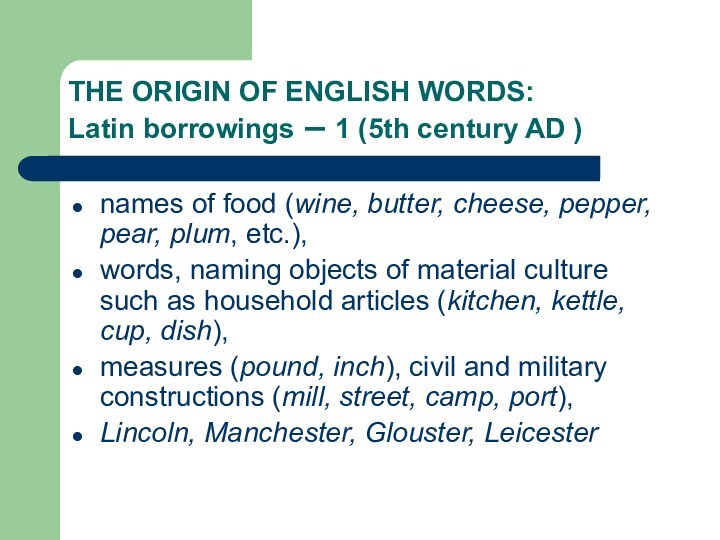
Latin borrowings – 1 (5th century
AD )
names of food (wine, butter, cheese, pepper, pear, plum,
etc.),
words, naming objects of material culture such as household articles (kitchen, kettle, cup, dish),
measures (pound, inch), civil and military constructions (mill, street, camp, port),
Lincoln, Manchester, Glouster, Leicester
Слайд 9
THE ORIGIN OF ENGLISH WORDS:
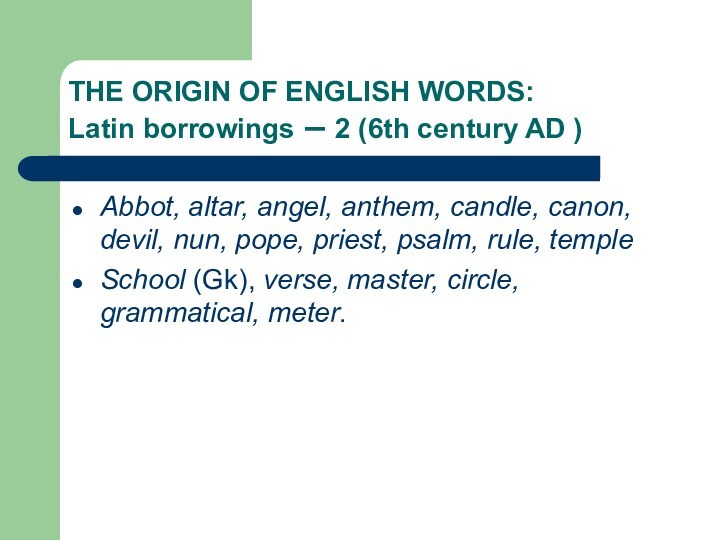
Latin borrowings – 2 (6th century
AD )
Abbot, altar, angel, anthem, candle, canon, devil, nun, pope,
priest, psalm, rule, temple
School (Gk), verse, master, circle, grammatical, meter.
Слайд 10
THE ORIGIN OF ENGLISH WORDS:
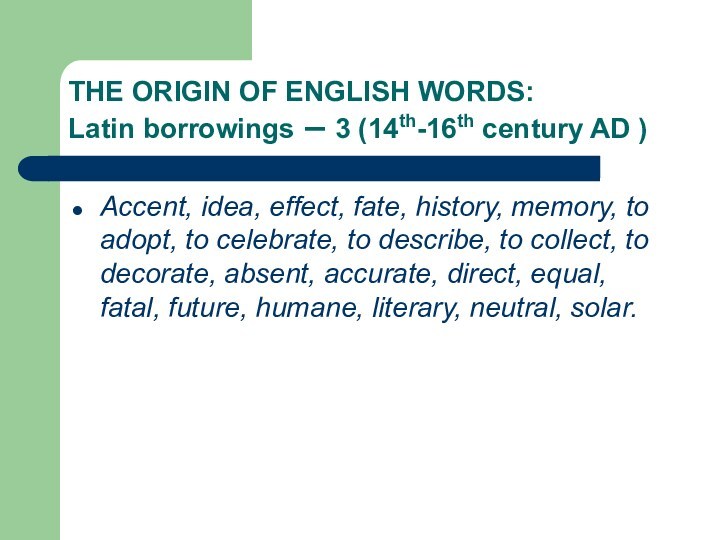
Latin borrowings – 3 (14th-16th century
AD )
Accent, idea, effect, fate, history, memory, to adopt, to
celebrate, to describe, to collect, to decorate, absent, accurate, direct, equal, fatal, future, humane, literary, neutral, solar.
Слайд 11
THE ORIGIN OF ENGLISH WORDS:
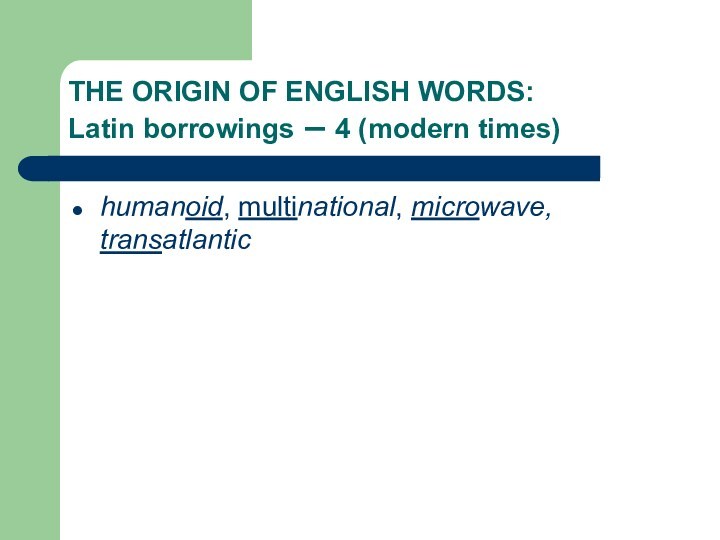
Latin borrowings – 4 (modern times)
humanoid,
multinational, microwave, transatlantic
Слайд 12
THE ORIGIN OF ENGLISH WORDS:
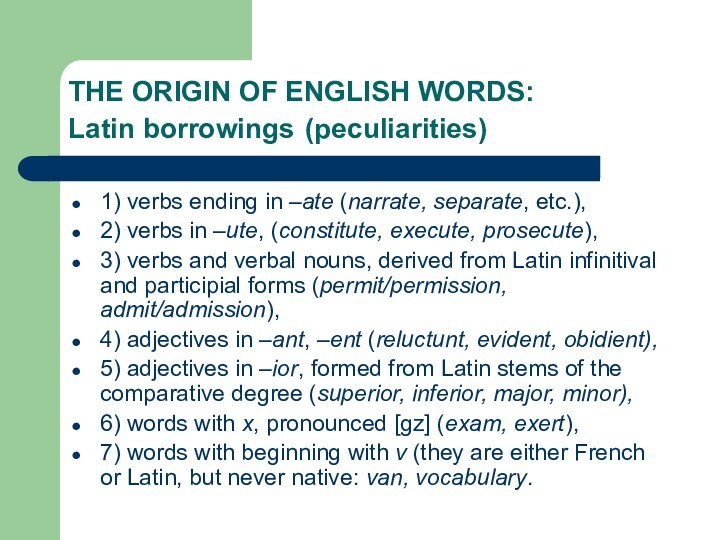
Latin borrowings (peculiarities)
1) verbs ending in
–ate (narrate, separate, etc.),
2) verbs in –ute, (constitute, execute, prosecute),
3) verbs and verbal nouns, derived from Latin infinitival and participial forms (permit/permission, admit/admission),
4) adjectives in –ant, –ent (reluctunt, evident, obidient),
5) adjectives in –ior, formed from Latin stems of the comparative degree (superior, inferior, major, minor),
6) words with x, pronounced [gz] (exam, exert),
7) words with beginning with v (they are either French or Latin, but never native: van, vocabulary.
Слайд 13
THE ORIGIN OF ENGLISH WORDS:
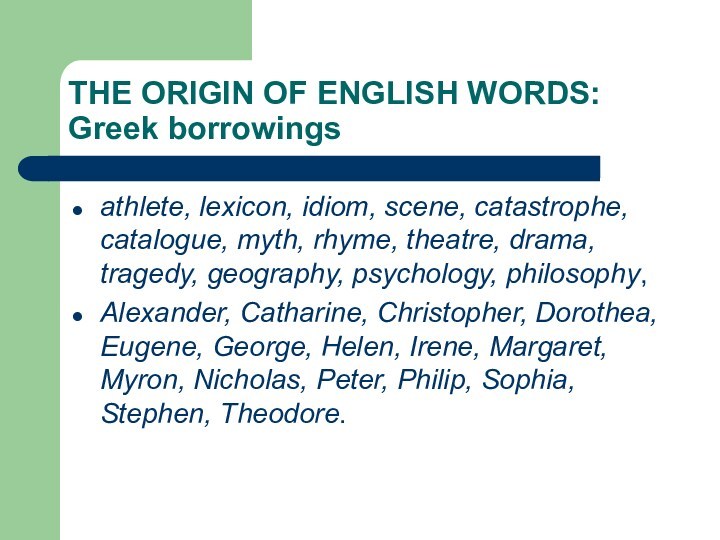
Greek borrowings
athlete, lexicon, idiom, scene, catastrophe,
catalogue, myth, rhyme, theatre, drama, tragedy, geography, psychology, philosophy,
Alexander, Catharine,
Christopher, Dorothea, Eugene, George, Helen, Irene, Margaret, Myron, Nicholas, Peter, Philip, Sophia, Stephen, Theodore.
Слайд 14
THE ORIGIN OF ENGLISH WORDS:
![Etymology of english words. Native and borrowed words in english THE ORIGIN OF ENGLISH WORDS: Greek borrowings (peculiarities)1) the sound [k] -](https://mypreza.com/img/tmb/3/252667/083189c9b84adcbe6d6a79634a4e5c9c-720x.jpg)
Greek borrowings (peculiarities)
1) the sound [k]
— ch (Christ, character),
2) the letter p — before
s (psychic) and n (pneumonia),
3) the sound [f] — ph (alphabet, emphasis),
4) the sound [r] – rh, rrh (diarrhea, rhetoric),
5) i instead of y (system, sympathy),
6) the letter x — [z] (xenophobia, xenon, Xerox)
Слайд 15
THE ORIGIN OF ENGLISH WORDS:
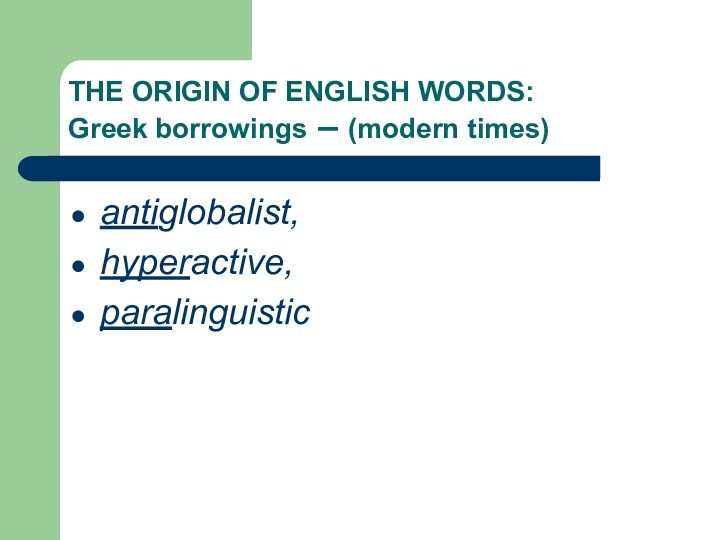
Greek borrowings – (modern times)
antiglobalist,
hyperactive,
paralinguistic
Слайд 16
THE ORIGIN OF ENGLISH WORDS:
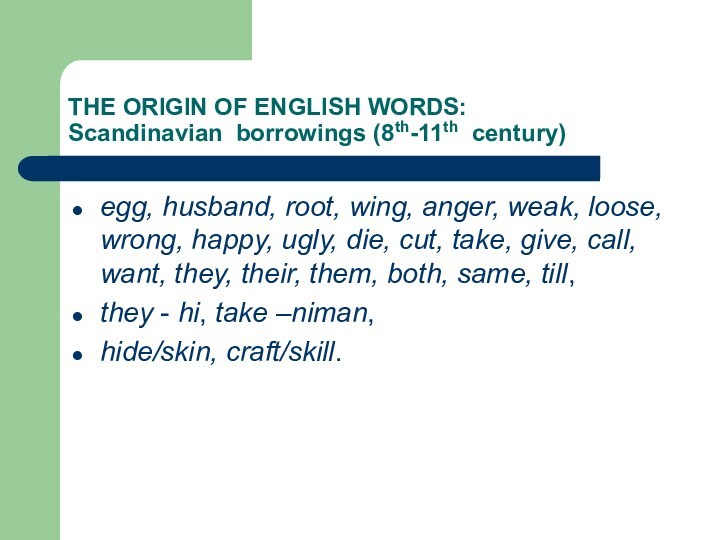
Scandinavian borrowings (8th-11th century)
egg, husband, root,
wing, anger, weak, loose, wrong, happy, ugly, die, cut, take,
give, call, want, they, their, them, both, same, till,
they — hi, take –niman,
hide/skin, craft/skill.
Слайд 17
THE ORIGIN OF ENGLISH WORDS:
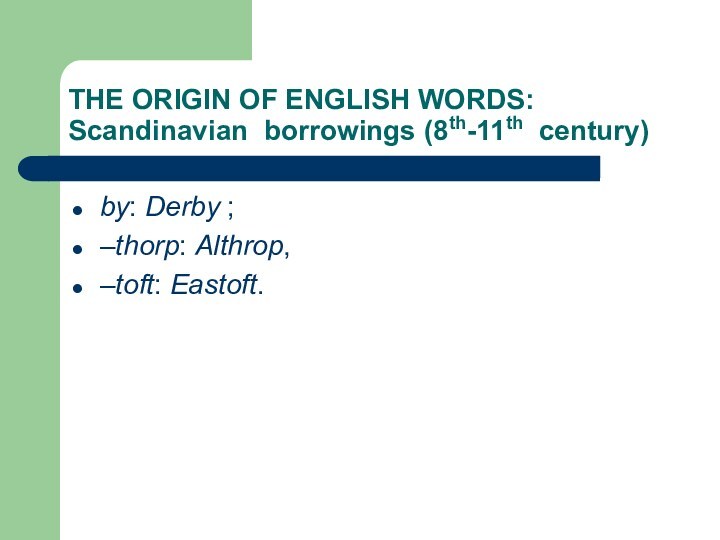
Scandinavian borrowings (8th-11th century)
by: Derby ;
–thorp: Althrop,
–toft: Eastoft.
Слайд 18
THE ORIGIN OF ENGLISH WORDS:
![Etymology of english words. Native and borrowed words in english THE ORIGIN OF ENGLISH WORDS: Scandinavian borrowings (peculiarities)[sk] sk/sc (sky, skill, ski,](https://mypreza.com/img/tmb/3/252667/c35119f9e099bc9c547873c4929b3621-720x.jpg)
Scandinavian borrowings (peculiarities)
[sk] sk/sc (sky, skill,
ski, scrape, scare),
[i:], [i] and [e] after k (kettle,
key, kilt, kid).
Слайд 19
THE ORIGIN OF ENGLISH WORDS:

French borrowings – 1 (11th century)
1)
religious terms: religion, clergy, paradise, prayer, saint, sacrifice, vice, virtue;
2)
administrative terms: state, government, parliament, nation, reign, country;
3) legal terms: court, judge, justice, jury, defendant, crime, penalty;
4) military terms: army, war, battle, officer, enemy;
5) educational terms: pupil, lesson, library, pen, pencil;
6) terms of art, architecture and literature: art, literature, architecture, poet;
7) words denoting pleasures: pleasure, joy, delight, comfort, leisure;

Слайд 20
THE ORIGIN OF ENGLISH WORDS:
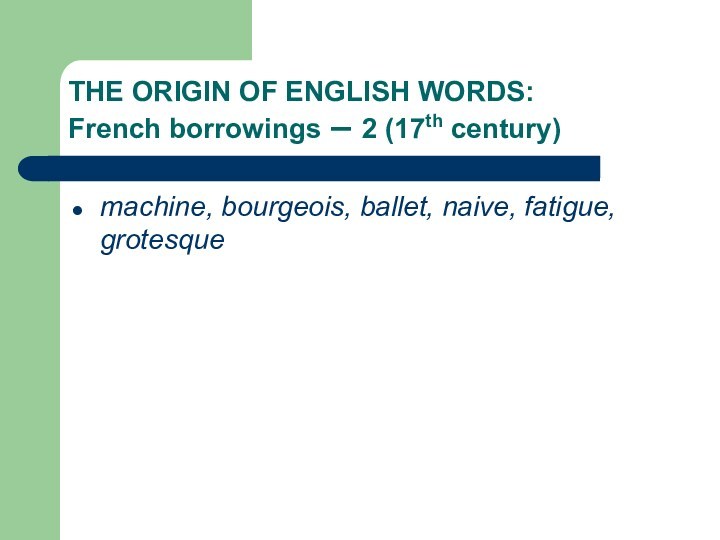
French borrowings – 2 (17th century)
machine,
bourgeois, ballet, naive, fatigue, grotesque
Слайд 21
THE ORIGIN OF ENGLISH WORDS:
![Etymology of english words. Native and borrowed words in english THE ORIGIN OF ENGLISH WORDS: French borrowings (peculiarities)the letters j, g [dз]](https://mypreza.com/img/tmb/3/252667/5ca11f9d2546fc65e048ea0374c1436a-720x.jpg)
French borrowings (peculiarities)
the letters j, g
[dз] or v at the beginning of the word ,
the
letter combinations and letters ch, ou [u:]; ps and t at the end of the word;
the sound [zh], the sound combinations [bw], [lw], [mw], [nw],
the stress falling on the last syllable.
Слайд 22
THE ORIGIN OF ENGLISH WORDS:
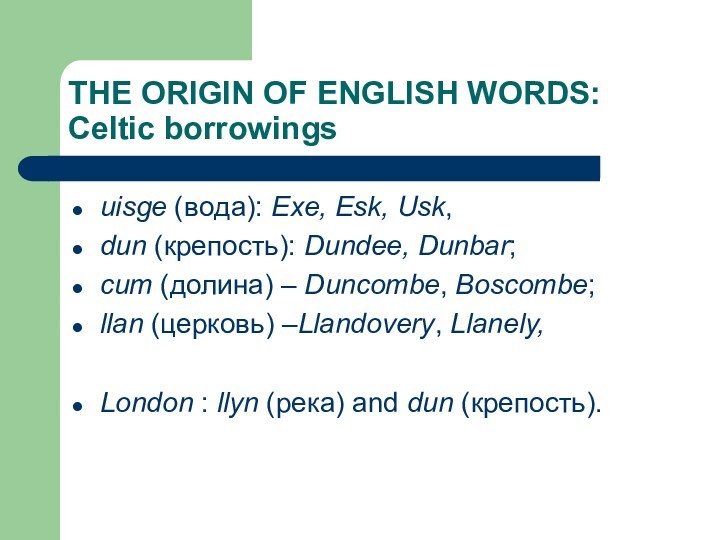
Celtic borrowings
uisge (вoда): Exe, Esk, Usk,
dun
(крепость): Dundee, Dunbar;
cum (долина) – Duncombe, Boscombe;
llan (церковь)
–Llandovery, Llanely,
London : llyn (река) and dun (крепость).
Слайд 23
THE ORIGIN OF ENGLISH WORDS:

Italian borrowings
1) words from the sphere
of art: aria, baritone, concert, opera, piano, violin, sonata, tempo,
scenario, fresco, studio,
2) military terms: alarm, cartridge, cavalery, regimen, captain, colonel, pistol, campaign, brave, ambush, attack;
3) names of food: ravioli, spaghetti, macaroni, pizza,
4) festive terms: confetti, costume, masquerade, carnival, carrousel, tarantella;
5) religious terms: Madonna, cardinal;
6) crimes: charlatan, bandit, assassin, contraband, vendetta, mafia;
7) banking terms: cash, debit, credit, deposit, bank, bankrupt;
Слайд 24
THE ORIGIN OF ENGLISH WORDS:
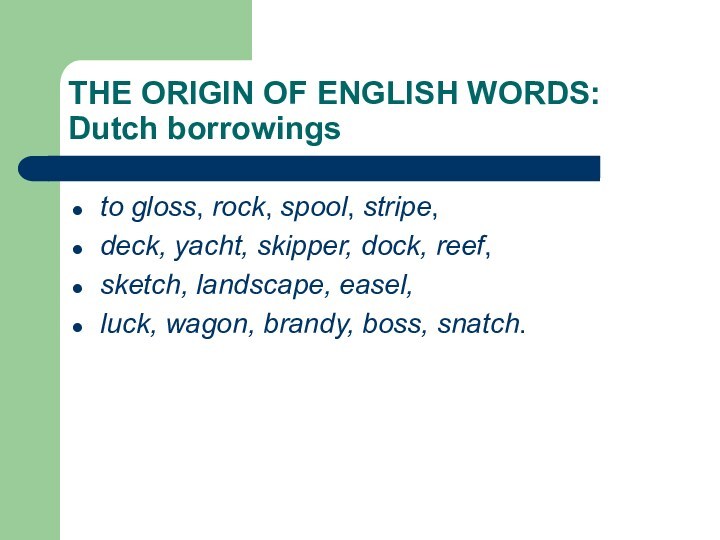
Dutch borrowings
to gloss, rock, spool, stripe,
deck, yacht, skipper, dock, reef,
sketch, landscape, easel,
luck, wagon, brandy,
boss, snatch.
Слайд 25
THE ORIGIN OF ENGLISH WORDS:
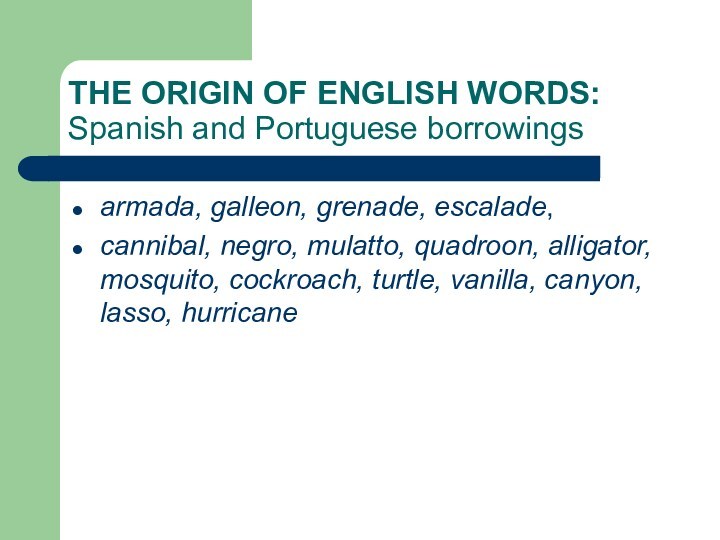
Spanish and Portuguese borrowings
armada, galleon, grenade,
escalade,
cannibal, negro, mulatto, quadroon, alligator, mosquito, cockroach, turtle, vanilla, canyon,
lasso, hurricane
Слайд 26
THE ORIGIN OF ENGLISH WORDS:
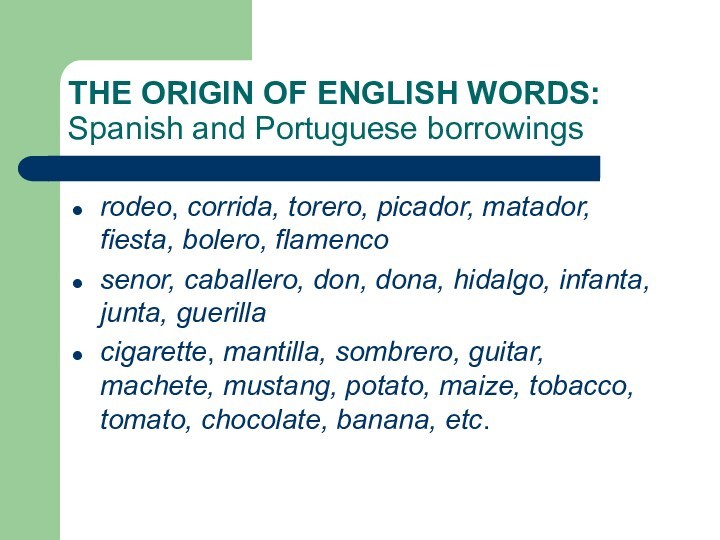
Spanish and Portuguese borrowings
rodeo, corrida, torero,
picador, matador, fiesta, bolero, flamenco
senor, caballero, don, dona, hidalgo, infanta,
junta, guerilla
cigarette, mantilla, sombrero, guitar, machete, mustang, potato, maize, tobacco, tomato, chocolate, banana, etc.
Слайд 27
THE ORIGIN OF ENGLISH WORDS:
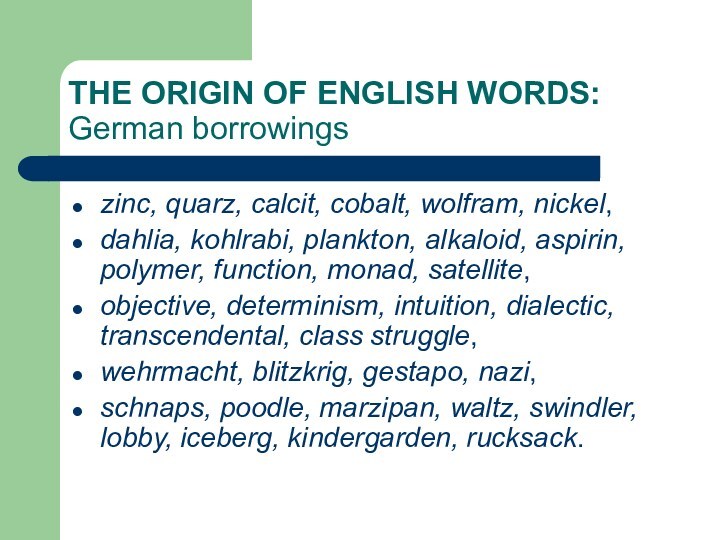
German borrowings
zinc, quarz, calcit, cobalt, wolfram,
nickel,
dahlia, kohlrabi, plankton, alkaloid, aspirin, polymer, function, monad, satellite,
objective, determinism,
intuition, dialectic, transcendental, class struggle,
wehrmacht, blitzkrig, gestapo, nazi,
schnaps, poodle, marzipan, waltz, swindler, lobby, iceberg, kindergarden, rucksack.
Слайд 28
THE ORIGIN OF ENGLISH WORDS:
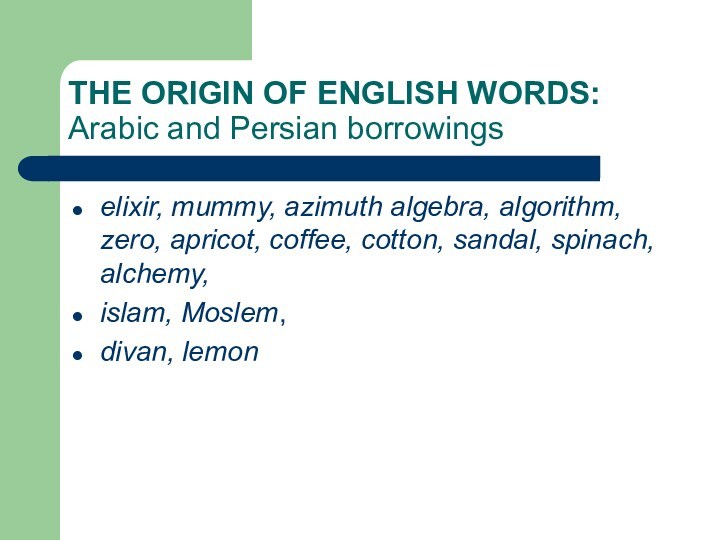
Arabic and Persian borrowings
elixir, mummy, azimuth
algebra, algorithm, zero, apricot, coffee, cotton, sandal, spinach, alchemy,
islam,
Moslem,
divan, lemon
Слайд 29
THE ORIGIN OF ENGLISH WORDS:

Russian borrowings
tsar, kvass, vodka, telega, shuba,
rouble, muzhik, steppe, taiga, samovar, troika,
narodnik, nihilist, Decembrist, intelligentsia, Periodic
law, chernozem,
Soviet, Bolshevik, Komsomol, kolkhoz,
perestroyka, uskoreniye.
Слайд 30
THE ORIGIN OF ENGLISH WORDS:
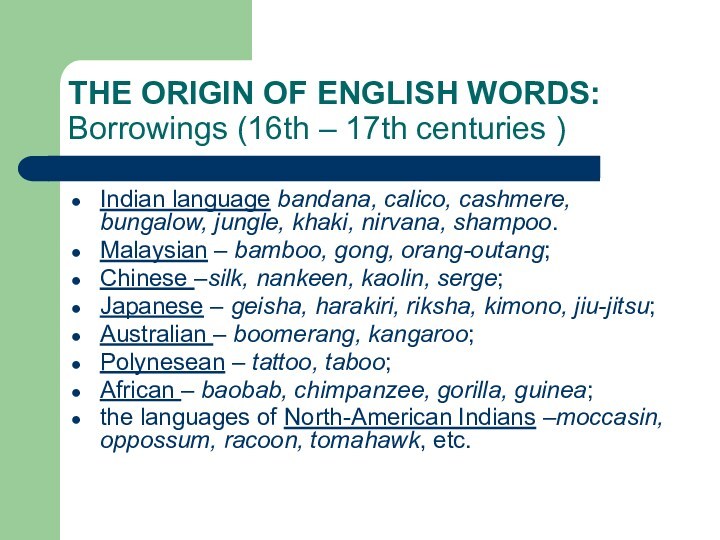
Borrowings (16th – 17th centuries )
Indian
language bandana, calico, cashmere, bungalow, jungle, khaki, nirvana, shampoo.
Malaysian
– bamboo, gong, orang-outang;
Chinese –silk, nankeen, kaolin, serge;
Japanese – geisha, harakiri, riksha, kimono, jiu-jitsu;
Australian – boomerang, kangaroo;
Polynesean – tattoo, taboo;
African – baobab, chimpanzee, gorilla, guinea;
the languages of North-American Indians –moccasin, oppossum, racoon, tomahawk, etc.
Слайд 31
ASSIMILATION OF LOAN WORDS
1) completely assimilated words;
2) partially
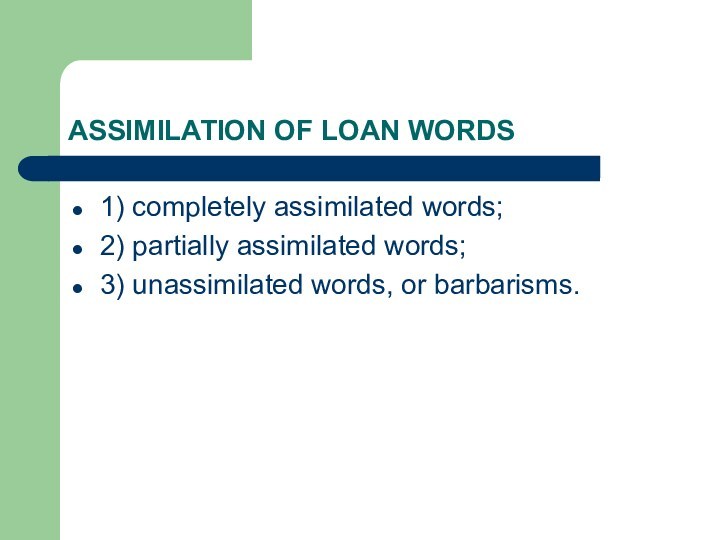
assimilated words;
3) unassimilated words, or barbarisms.
Слайд 32
ETYMOLOGICAL DOUBLETS
facere — fact and feat,
discus — disc,
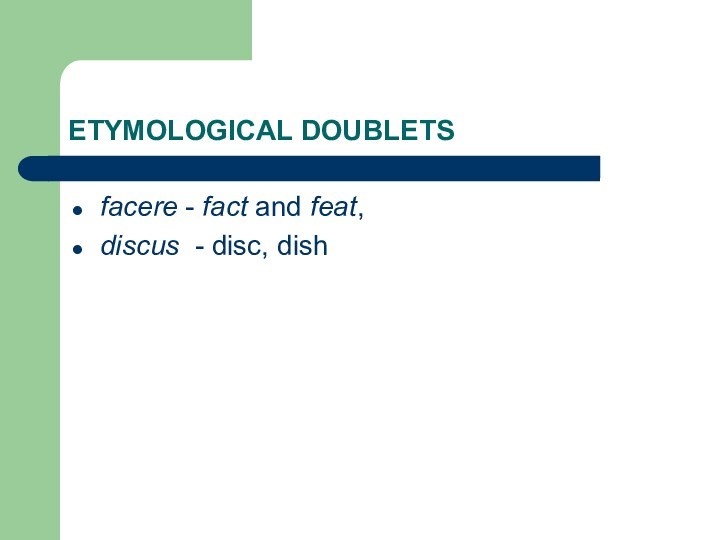
dish
Слайд 33
ETYMOLOGICAL DOUBLETS
1) share-scar, shirt-skirt (N+Sc);
2) canal (Lat) —
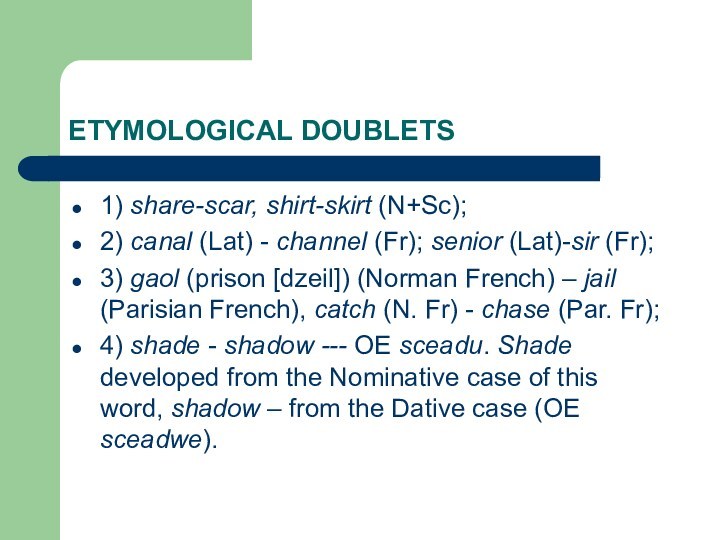
channel (Fr); senior (Lat)-sir (Fr);
3) gaol (prison [dzeil]) (Norman
French) – jail (Parisian French), catch (N. Fr) — chase
(Par. Fr);
4) shade — shadow — OE sceadu. Shade developed from the Nominative case of this word, shadow – from the Dative case (OE sceadwe).
Слайд 34
INTERNATIONAL WORDS
second, minute, professor, opera, jazz, sport,
laptop, DVD

disc, genetic code, bionics,
sports (football, volleyball, hockey),
clothes (pullover, sweater,
leggins, jersey),
food and drinks (pizza, spagetti),
avocado, grapefruit, mango, anaconda.
Слайд 35
INTERNATIONAL WORDS
control : : контроль; general : :

генерал; industry : : индустрия,
magazine :
: магазин,
football, out, match, tennis, time, jersey, pullover, sweater, nylon,
tweed, film, club, cocktail, jazz
Native Etymologically the vocabulary of the English language is far from being homogenous. It consists of two layers — the native stock of words and the borrowed stock of words In fact native words comprise only 30% of the total number of words in the English vocabulary. The native words have a wider range of lexical and grammatical valency, they are highly polysemantic and productive in forming word clusters and set expressions.
Borrowings-the term is used to denote the process of adopting words from other languages and also the result of this process. Borrowed words or loanwords are words taken from another language and modified according to the patterns of the receiving language. In many cases a borrowed word especially one borrowed long ago is practically indistinguishable
from a native word without a thorough etymological analysis.
Source of borrowings. — is appliede to the lang from which particular words were taken into Engl. Original borrowings. — the term is applied to the language the word may be traced to. Assimilation — the process of the changing of the adopted words. A. of thr borrowings includes changes in: sound form; morphological strct; grammar charact-s; usage.
Completely assimilated borrowings — are the words which have undergone all types of Assimilation. They are active in word formation. Partially assim-d b. — the words which lack one of the types of A. They are subdivided into: borrow. not ass-d grammatically (nouns borrowed from Latin or Greek); borrow. not ass-d phonetically (contain peculiarities in stress, not standard for English); barbarisms — words from other lang. , used by English people in conversations or writing, but not assimilated in any way.
Why are words borrowed? Wars, conquests; trade, international and cultural relations; to fill the gap in vocabulary; words, which express some particular notion; enrichment of word groups (syn., ant…).
Тематику для зарубежной литературы.
Инфоурок
›
Другое
›Презентации›Words of native Origin and Borrowings
Скачать материал

Скачать материал


- Сейчас обучается 396 человек из 63 регионов




- Сейчас обучается 268 человек из 64 регионов


Описание презентации по отдельным слайдам:
-
1 слайд
Words of native Origin and Borrowings . Causes and Ways of Borrowings. Assimilation of Borrowings
-
2 слайд
Native words
A native word is a word which belongs to the original English stock as known from the earliest available manuscripts of the Old English period. Native words are further subdivided into the words of the Indo-European stock and those of the Common Germanic origin. -
3 слайд
Characteristic Features of the Native Vocabulary:
1. The words are monosyllabic: sun, wood, break.
2. They are polysemantic.
3. They are characterized by high frequency.
4. Native words are usually found in set-expressions.
5. Verbs with post-positions are usually native: to look for, to look after.
6. They are characterized by a wide range of lexical and grammatical valency.
7. If words begin with wh, wr, tw, dw, sw, sh. th; if at the end they have dge, tch,nd, ld; if the roots have ng, aw, ew, ee, oo they are native. -
4 слайд
Borrowing words
Borrowing words from other languages is characteristic of English throughout its history. More than two thirds of the English vocabulary are borrowings. Mostly they are words of Romanic origin (Latin, French, Italian, Spanish). Borrowed words are different from native ones by their phonetic structure, by their morphological structure and also by their grammatical forms. It is also characterisitic of borrowings to be non-motivated semantically. -
5 слайд
Borrowings can be classified according to different criteria:
a) according to the aspect which is borrowed,
b) according to the degree of assimilation,
c) according to the language from which the word was borrowed. -
6 слайд
There are two causes of borrowing into English:
-historical
-social -
7 слайд
Historically, on the one hand, English shares with West Germanic languages many common words and similar grammatical structures; on the other hand, more than half of the English vocabulary is derived from Latin. Some of these borrowings have been direct, but a great many came through French, some through other Romance languages, such as Italian, Spanish and Portuguese.
-
8 слайд
Socially, as the world develops so does the English language. Especially in the twentieth century, owing to the rapid development of the modern mass media, the international and cultural exchange and information, a great number of borrowed words have come into English. They have become a component part of the English vocabulary to satisfy needs of society.
-
9 слайд
Borrowings enter the language into ways:
— through oral speech
— and through written speech. -
-
11 слайд
Phonetic assimilation comprising changes in sound-form and stress is perhaps the most conspicuous.
Grammatical Assimilation. Usually as soon as words from other languages were introduced into English they lost their former grammatical categories and paradigms and acquired new grammatical categories and paradigms by analogy with other English words.
Lexical Assimilation. When a word is taken over into another language, its semantic structure as a rule undergoes great changes. -
Найдите материал к любому уроку, указав свой предмет (категорию), класс, учебник и тему:
6 209 605 материалов в базе
- Выберите категорию:
-
Выберите учебник и тему
- Выберите класс:
-
Тип материала:
-
Все материалы
-
Статьи
-
Научные работы
-
Видеоуроки
-
Презентации
-
Конспекты
-
Тесты
-
Рабочие программы
-
Другие методич. материалы
-
Найти материалы
Другие материалы
- 02.01.2021
- 5350
- 50


Разработка урока: «Әкем-сәулетші» (3 класс)
- Учебник: «Детская риторика в рассказах и рисунках. Учебная тетрадь для 3 класса. (в 2-х частях)», Ладыженская Т.А. и др.
- Тема: Употребляй слова правильно!
- 02.01.2021
- 2231
- 66

- 02.01.2021
- 1088
- 0
- 02.01.2021
- 1131
- 1
- 02.01.2021
- 1095
- 0
- 02.01.2021
- 1028
- 0
- 02.01.2021
- 1360
- 22
Вам будут интересны эти курсы:
-
Курс профессиональной переподготовки «Управление персоналом и оформление трудовых отношений»
-
Курс повышения квалификации «Педагогическая риторика в условиях реализации ФГОС»
-
Курс повышения квалификации «Основы управления проектами в условиях реализации ФГОС»
-
Курс повышения квалификации «Введение в сетевые технологии»
-
Курс повышения квалификации «Специфика преподавания конституционного права с учетом реализации ФГОС»
-
Курс повышения квалификации «Применение MS Word, Excel в финансовых расчетах»
-
Курс повышения квалификации «Организация маркетинга в туризме»
-
Курс профессиональной переподготовки «Организация деятельности по водоотведению и очистке сточных вод»
-
Курс профессиональной переподготовки «Теория и методика музейного дела и охраны исторических памятников»
-
Курс профессиональной переподготовки «Организация процесса страхования (перестрахования)»
-
Курс профессиональной переподготовки «Осуществление и координация продаж»
-
Настоящий материал опубликован пользователем Батанова Ольга Германовна. Инфоурок является
информационным посредником и предоставляет пользователям возможность размещать на сайте
методические материалы. Всю ответственность за опубликованные материалы, содержащиеся в них
сведения, а также за соблюдение авторских прав несут пользователи, загрузившие материал на сайтЕсли Вы считаете, что материал нарушает авторские права либо по каким-то другим причинам должен быть удален с
сайта, Вы можете оставить жалобу на материал.Удалить материал
-
- На сайте: 2 года и 3 месяца
- Подписчики: 0
- Всего просмотров: 74867
-
Всего материалов:
213
The most characteristic feature of English is usually said to be its mixed character. Many linguists consider foreign influence, especially that of French, to be the most important factor in the history of English. This wide-spread viewpoint is supported only by the evidence of the English word-stock, as its grammar and phonetic systems are very stable and not easily influenced by other languages.
To comprehend the nature of the English vocabulary and its historical development it is necessary to examine the etymology of different layers, the historical causes of their appearance, their volume and role and the comparative importance of native and borrowed elements in enriching the English vocabulary.
According to their origin words can be native and borrowed.
A native word is a word which belongs to the original English stock as known from the earliest available manuscripts of the Old English period.
Native words are further subdivided into the words of the Indo-European stock and those of the Common Germanic origin. The words having cognates in the vocabularies of different Indo-European languages form the oldest layer. It has been noticed that they readily fall into definite semantic groups. Among them we find terms of kinship (mother, father, son, daughter), names of animals and birds (cat, wolf, goose), parts of human body (arm, eye). Some of the most frequent verbs belong to this word stock: come, sit, stand. Most numerals are also of the Indo-European origin.
A bigger part of the native vocabulary consists of the words of the Common Germanic word stock. Such nouns as summer, winter, rain, ice, hat; the verbs to bake, to buy, to make, to meet; the adjectives deaf, dead, deep are of the Common Germanic origin. Most adverbs and pronouns also belong here.
Together with the words of the Common Indo-European stock the Common Germanic words form the bulk of the most frequent elements used in any style of speech.
Characteristic Features of the Native Vocabulary
1. The words are monosyllabic: sun, wood, break.
2. They are polysemantic: hand – 1. Part of the human body. 2. Power, possession, by a responsibility.3. Influence. 4. Person from whom news comes. 5. Skill in using one’s hands. 6. Person who does what is indicated by the context, performer. 7. Workman. 8. Share in activity. 9. Pointer, indicator. 10. Position or direction. 11. Handwriting. 12. Signature. 13. Number of cards held by a player. 14. Unit of measurement. 15. Applause by clapping.
3. They are characterised by high frequency.
4. Native words are usually found in set-expressions.
5. Verbs with post-positions are usually native: to look for, to look after.
6. They are characterised by a wide range of lexical and grammatical valency.
7. If words begin with wh, wr, tw, dw, sw, sh. th; if at the end they have dge, tch,nd, ld; if the roots have ng, aw, ew, ee, oo they are native.
Borrowing words from other languages is characteristic of English throughout its history. More than two thirds of the English vocabulary are borrowings. Mostly they are words of Romanic origin (Latin, French, Italian, Spanish). Borrowed words are different from native ones by their phonetic structure, by their morphological structure and also by their grammatical forms. It is also characterisitic of borrowings to be non-motivated semantically.
English history is very rich in different types of contacts with other countries, that is why it is very rich in borrowings. The Roman invasion, the adoption of Cristianity, Scandinavian and Norman conquests of the British Isles, the development of British colonialism and trade and cultural relations served to increase immensely the English vocabulary. The majority of these borrowings are fully assimilated in English in their pronunciation, grammar, spelling and can be hardly distinguished from native words.
English continues to take in foreign words, but now the quantity of borrowings is not so abundunt as it was before. All the more so, English now has become a «giving» language, it has become Lingva franca of the twentieth century.
Borrowings can be classified according to different criteria:
a) according to the aspect which is borrowed,
b) according to the degree of assimilation,
c) according to the language from which the word was borrowed.
(In this classification only the main languages from which words were borrowed into English are described, such as Latin, French, Italian. Spanish, German and Russian.
Causes and ways of borrowings
In its 15 century long history recorded in written manuscripts the English language happened to come in long and close contact with several other languages, mainly Latin, French and Old Norse (or Scandinavian). The great influx of borrowings from these sources can be accounted for by a number of historical causes. Due to the great influence of the Roman civilization Latin was for a long time used in England as the language of learning and religion. Old Norse was the language the conquerors who were on the same level of social and cultural development and who merged rather easily with the local population in the 9th, 10th ant the first half of the 11th century.
French (to be more exact its Norman dialect) was the language of the other conquerors who brought with them a lot of new notions of a higher social system — developed feudalism, it was the language of upper classes, official documents and school instruction from the middle of the 11th century to the end of the 14th century.
In the study of the borrowed elements in English the main emphasis is as a rule placed on the Middle English period. Borrowings of the later periods became the object of investigation only in recent years. This investigations have shown that the flow of borrowings has been stead and uninterrupted. The greatest number has come from French. They refer to various fields of social — political, scientific and the cultural life. A large portion of borrowings (41%) is scientific and technical terms.
There are two causes of borrowing into English: historical and social.
Historically, on the one hand, English shares with West Germanic languages many common words and similar grammatical structures; on the other hand, more than half of the English vocabulary is derived from Latin. Some of these borrowings have been direct, but a great many came through French, some through other Romance languages, such as Italian, Spanish and Portuguese.
The influence of foreign languages on the English language has been the result of the succession of invaders who came into contact with the English people during the Middle Ages, on the one hand. On the other hand, invasions and trade by the English themselves have carried English to most parts of the world, and at the same time brought many words from foreign languages into English.
Socially, as the world develops so does the English language. Especially in the twentieth century, owing to the rapid development of the modern mass media, the international and cultural exchange and information, a great number of borrowed words have come into English. They have become a component part of the English vocabulary to satisfy needs of society.
Borrowings enter the language into ways: through oral speech (by immediate contact between the peoples) and through written speech (by indirect contact through books, etc.).
Oral borrowing took place chiefly in the early periods of history, where as in recent times written borrowing gained importance. Words borrowed orally (e.g. L. inch, mill, street) are usually short and they undergo considerable changes in the act of adoption. Written borrowings (e.g. Fr. Communiquй, belles — letters, naпvetй) preserve their spelling and some peculiarities of their sound — form, their assimilation is a long and laborious process.
Assimilation of Borrowings
It is now essential to analyze the changes that borrowings have undergone in the English language and how they have adapted themselves to its peculiarities.
All the changes that borrowed elements undergo may be divided into two large groups.
On the one hand there are changes specific of borrowed words only. These changes aim at adapting words of foreign origin to the norms of the borrowing language, e.g. the consonant combinations [pn], [ps], [pt] in the words pneumatics, psychology, Ptolemey of Greek origin were simplified into [n], [s], [t], since the consonant combinations [ps], [pt], [pn], very frequent at the end of English words (as in sleeps, stopped,etc.), were never used in the initial [ks] was changed into [z] (as in Gr. Xylophone).
The suffixes — ar,- or,- ator in early Latin borrowings were replaced by the highly productive Old English swuffix — ere,as in L. Caesar — OE., Casere;L. sutor — OE. sutere.
By analogy with the great majority of nouns that form their plural — s, borrowings, even very recent ones, have assumed this inflection instead of their original plural endings.
On the other hand we observe changes that are characteristic of both borrowed and native words. These changes are due to the development of the word according to the laws of the given language. When the highly inflected Old English system of declension changed into the simpler system of Middle English, early borrowings conformed with the general rule. Under the influence of the so-called inflexional leveling borrowings like disc (Mn.E dish) that had a number of grammatical forms in Old English acquired only three forms in Middle English: common case and possessive case singular and plural (fellow, fellowes, fellowes).
It is very important to discriminate between the two processes — the adaptation of borrowed material to the norms of the language and the development of these words according to the laws of the language.
This differentiation is not always easily discernible. In most cases it must resort to historical analysis before we can draw any definite. There is nothing in the form of the words procession and progression to show that the former was already used in England in the 11th century, the latter not till the 15th century. The history of these words reveals that the word procession has undergone a number of changes alongside with other English words (change in declension, accentuation, structure, sounds), Whereas the word progression underwent some changes by analogy with the word procession and other similar words already at the time of its appearance in the language.
Phonetic, Grammatical and Lexical Assimilation of Borrowings
Since the process of assimilation of borrowings includes changes in sound-form, morphological structure, grammar, characteristics, meaning and usage. Linguists distinguish phonetic, grammatical and lexical assimilation of borrowings.
Phonetic assimilation comprising changes in sound-form and stress is perhaps the most conspicuous.
Sounds that were alien to the English language were fitted into its scheme of sounds. For instance, the long [e] and [е] in recent French borrowings, alien to English speech, are rendered with the help of [ei] (as in the words communiquй, chaussйe, cafй).
Familiar sounds or sound combinations the position of which was strange to the English language, were replaced by other sounds or sound combinations to make the words conform to the norms of the language, e.g. German spitz [pits] was turned into English [spits]. Substitution of native sounds for foreign ones usually takes place in the very act of borrowing. But some words retain their foreign pronunciation for a long time before the unfamiliar sounds are replaced by similar native sounds.
Even when a borrowed word seems at first sight to be identical in form with its immediate etymon as OE. skill <;Scand. skil;OE. scinn <;Scand. skinn; the phonetic structure of the word undergoes some changes, since every language as well as every period in the history of a language is characterized by its own pedculiarities in the articulation of sounds.
In words that were added to English from foreign sources, especially from French or Latin, the accent was gradually transferred to the first syllable. Thus words like honour, reason were accented on the same principle as the native father, mother.
Grammatical Assimilation. Usually as soon as words from other languages were introduced into English they lost their former grammatical categories and paradigms and acquired new grammatical categories and paradigms by analogy with other English words.
However, there are some words in Modern English that have for centuries retained their foreign inflexions. Thus a considerable group of borrowed nouns, all of them terms or literary words adopted in the 16th century or later, have preserved their original plural inflexion to this day, e.g. phenomenon (L.) — phenomena. Other borrowings of the same period have two plural forms — the native and the foreign, e.g. vacuum (L.) — vacua, vacuums, virtuoso (It.) — virtuosi, virtuosos.
All borrowings that were composite in structure in their native language appeared in English as indivisible simple words, unless there were already words with the same morphemes in it, e.g. in the word saunter the French infinitive inflexion — er is retained, but it has changed its quality, it is preserved in all the other grammatical forms of the word (cf. saunters, sauntered, sauntering), which means that it has become part of the stem in English.
Sometimes in borrowed words foreign affixes are replaced by those available in the English language, e.g. the inflexion — us in Latin adjectives was replaced in English with the suffixes — ous or — al: L. barbarous >;E. barbarous;L. botanicus >;E. botanical.
Lexical Assimilation. When a word is taken over into another language, its semantic structure as a rule undergoes great changes.
Polysemantic words are usually adopted only in one or two of their meanings. Thus the word timbre that had a number of meanings in French was borrowed into English as a musical term only. The words cargo and cask,highly polysemantic in Spanish, were adopted only in one of their meanings — `the goods carried in a ship’, `a barrel for holding liquids’ respectively.
In the process of its historical development a borrowing sometimes acquired new meanings that were not to be found in its former semantic structure. For instance, the verb move in Modern English has developed the meanings of `propose’, `change one’s flat’, `mix with people’. The word scope, which originally had the meaning of `aim, purpose’, now means `ability to understand’, `the field within which an activity takes place, sphere’, `opportunity, freedom of action’. As a rule the development of new meanings takes place 50-100 years after the word is borrowed.
The semantic structure of borrowings changes in other ways as well. Some meanings become more general, others more specialized, etc. For instance, the word terrorist,that was takenover from French in the meaning of `Jacobin’, widened its meaning to `one who governs, or opposes a government by violent means’. The word umbrella, borrowed in the meaning of a `sunshade’ or `parasol’ (from It. ombrella < ombra — `shade’) came to denote similar protection from the rain as well.
Usually the primary meaning of a borrowed word is retained throughout its history, but sometimes it becomes a secondary meaning. Thus the Scandinavian borrowings wing, root, take and many others have retained their primary meanings to the present day, whereas in the OE. fлola e (Mn.E. fellow) which was borrowed from the same source in the meaning of `comrade, companion’, the primary meaning has receded to the background and was replaced by the meaning that appeared in New English `a man or a boy’.
Sometimes change of meaning is the result of associating borrowed words with familiar words which somewhat resemble them in sound but which are not at all related. This process, which is termed f o l k e t y m o l o g y, often changes the form of the word in whole or in part, so as to bring it nearer to the word or words with which it is thought to be connected, e.g. the French verb sur(o) under had the meaning of `overflow’. In English — r(o) under was associated by mistake with round and the verb was interpreted as meaning `enclose on all sides, encircle’ (Mn.E. surround).
Folk — etymologization is a slow process; people first attempt to give the foreign borrowing its foreign pronunciation, but gradually popular use evolves a new pronunciation and spelling.
The role of loan words in the formation and development of English vocabulary is dealt with in the history of the language. It is there that the historical circumstances are discussed under which words borrowed from Latin, from Scandinavian dialects, from Norman and Parisian French and many other languages, including Russian, were introduced into English. Lexicology, on the other hand, has in this connection tasks of its own, being chiefly concerned with the material and the results of assimilation.
|
Аальтернативная стоимость. Кривая производственных возможностей В экономике Буридании есть 100 ед. труда с производительностью 4 м ткани или 2 кг мяса… |
Вычисление основной дактилоскопической формулы Вычислением основной дактоформулы обычно занимается следователь. Для этого все десять пальцев разбиваются на пять пар… |
Расчетные и графические задания Равновесный объем — это объем, определяемый равенством спроса и предложения… |
Кардиналистский и ординалистский подходы Кардиналистский (количественный подход) к анализу полезности основан на представлении о возможности измерения различных благ в условных единицах полезности… |
|
Признаки классификации безопасности Можно выделить следующие признаки классификации безопасности. Прием и регистрация больных Пути госпитализации больных в стационар могут быть различны. В центральное приемное отделение больные могут быть доставлены: ПУНКЦИЯ И КАТЕТЕРИЗАЦИЯ ПОДКЛЮЧИЧНОЙ ВЕНЫ |















